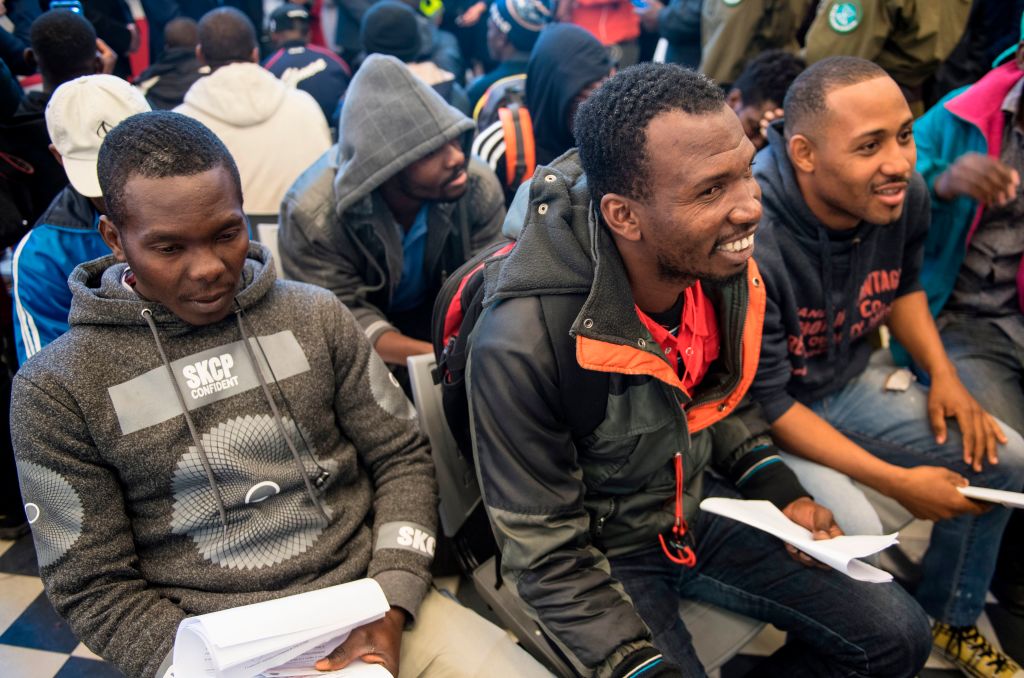Haitian immigrants covered by Temporary Protected Status (TPS) are anxiously awaiting a case being heard in New York federal court that challenges President Donald Trump’s decision to end the special status in July. TPS protects about 5,200 Haitian immigrants in New York, and 46,000 in total, from deportation after a 7.0 magnitude earthquake struck near Haiti’s capital, Port-au-Prince, in January 2010, killing more than 300,000 people.
The case known as Saget et al v. Trump et al. is in response to was after then-acting Homeland Security Secretary Elain Duke announced in 2019 that Haitains covered under this protection would have 18 months to either return to their impoverished Caribbean country or legalize their status in the United States.
“The decisions of Trump, his staff and the federal agencies disregard the administration’s own findings from months earlier and are nothing short of capricious, arbitrary and an abuse of discretion,” said Ira Kurzban, one of the attorneys for the plaintiffs, which include group of nine Haitian nationals whose TPS is at risk. “Make no mistake, Trump’s decision to terminate Haitian TPS is motivated by his repellent bias towards Haitians and other people of color.”
Since 2010, Haiti has been struck by an earthquake, an epidemic of cholera and a hurricane more devastating than the island had seen in over half a century. Steve Forester, immigration policy coordinator for the Institute for Justice and Democracy in Haiti (IJDH), describes Haiti’s ingoing crises as “sledgehammer blows” debilitating the island nation.
For the 46,000 Haitian nationals already in the US who are unable to safely return, the Temporary Protected Status they received in 2010 is vital to their ability not only survive in the US but care for families still on the island without means. If this court challenge does not go in their favor, they could face deportation once their TPS protections end in July of 2019.
What faces the Haitian refugees back home
Part of the case made by the plaintiffs is that Haiti is simply unsafe for TPS recipients to return to. This isn’t just a moral issue, however: the IJDH maintains that the Trump administration violated the law and TPS recipients’ Constitutional rights in ending protections for the Haitian refugees.
“There’s no question that Haiti merited extension of its TPS designation,” Forester said. “Department [of Homeland Security] officials in internal documents acknowledge that conditions still merited TPS.”
According to advocates, ending TPS for Haitian refugees while living conditions on the island are so tenuous constitutes a violation of the Administrative Procedures Act.
“Haiti is a textbook case for TPS on the facts, as editorial boards and political and civic leaders have recognized,” Forester stated. “Getting to ‘no’ required DHS to ignore the reality on the ground and move the goalposts on the applicable criteria.”
The plaintiffs argue that Trump’s attempt to shut down TPS for Haitian refugees is an explicitly racist effort, with the president having stated previously that Haitians “all have AIDS,” and demanding “why would we want any more Haitians?”
“The executive branch has authority in immigration matters, but not to be racist,” Forester added. “Trump’s motivations have been clear.”
Next steps
The trial is expected to last four days, but even if the courts rule in favor of the plaintiffs, Forester expects the fight to continue.
“We think the merits of the case are very strong,” he said, but added that he anticipates the case will be appealed no matter the outcome.
And as important as maintaining their TPS designation is for Haitian refugees, it leaves many questions unanswered. The law does not establish a path to citizenship for TPS recipients, meaning that they enjoy little to no security as to their future prospects.
Additionally, maintaining TPS status is a significant financial burden: recipients must reapply for protected status every eighteen months, a process that costs $490 per person. Six months prior to announcing the end of TPS for Haitian refugees, the Trump administration elected to continue it for six months, meaning that many people were forced to pay close to $1000 in a single year, just to avoid being deported for another eighteen months.
When Temporary Protected Statuses do end (being, after all, Temporary), refugees who paid for documentation find themselves in worse positions those who stayed off of government books. Since part of the application process requires informing the government of their home address, TPS recipients are much more easily and quickly deported than undocumented immigrants.
These eventual deportations leave significant loose ends. Though there are close to 40,000 TPS recipients currently registered, these Haitian refugees have an estimated 27,000 US-born children, whose birthright citizenship cannot help their parents.
According to Forester and the IJDH, winning this case isn’t enough. “Congress should act to cover the vulnerable TPS populations,” he said.
















